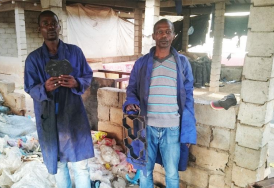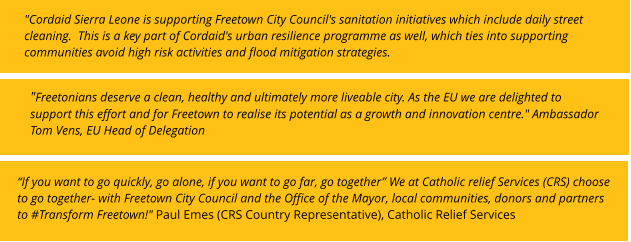Targets & Initiatives for Sanitation

“Poor waste management has been a public health issue in Freetown for quite some time Communities will benefit in terms of health, there be less expenditure on illnesses related to poor waste management and a better quality of life by reduction of garbage in the community. ”
Councillor Abdul Karim Turay, Ward 446, Juba/Kaningo
Target 1
Ensure that 60% of Freetown’s solid and liquid waste is safely collected, managed and disposed of by 2022
Initiative 1
Lead

Description
Establish efficient, effective and sustainable disposal management for solid and liquid waste by,
- Improved management of existing facilities
- Upgrading Kingtom and Waterloo dumpsites into engineered landfills where technically/ environmentally appropriate
- Safely closing Kissy dumpsite
- Introduce decentralized faecal sludge disposal and treatment units and upgrade existing polders at Kingtom
- Conducting a feasibility study at existing dumpsites to include: use of weigh bridge & pilot a Material Recovery Facility to determine viability of expansion
- Delivering of a pilot decentralized unit to convert organic waste to energy with potential for citywide scale
- Identifying an appropriate new sanitary landfill and liquid waste treatment site(s) within the Western Area
Initiative 2
Lead

Description
Identify and sustainably remove all existing illegal dumpsites by,
- Involving the private sector to clear existing illegal dumpsites and linking clearance with communities via the cleanest zone competition
- Ensuring FCC enforcement and community ownership to keep their areas clean once removed
Initiative 3
Lead

Description
Ensure community engagement and ownership by establishing cleanest zone in Freetown competition by,
- First prize for cleanest zone of 10 solar powered street lights, a water point, road paved with recycled plastic tiles and 10 school scholarships to cover cost of uniforms, etc. (5 junior and 5 secondary, for 6 girls and 4 boys)
- 4 runner-up prizes where the community can choose one of the options
- Independent panel of judges to be appointed
- Current baseline level of cleanliness set for each zone by an inspection
- Secret inspection followed by final inspection first week of December 2018
- Winners determined by increase in cleanliness against the baseline to ensure fairness
- Prizes to be award in March 2019, then every 6 months thereafter
- Criteria for winning are cleanliness of streets, drainage, etc.; beautification (greenery, street art); sustainability (one off clean or system implemented) and innovation
Initiative 4
Lead

Description
Establish a sustainable solid & liquid waste management system, which includes solid waste separation at source, by establishing an appropriate zoning system with capable private sector companies servicing each zone, using community-based businesses in a sub-contracting or franchise model by the following methods tested by a pilot scheme:
Regulatory/enforcement
- Review existing & where necessary implement new legislation/bye-laws
- Enforce legislation & bye-laws
- Implement demand & supply monitoring system (physical & electronic)
- Ensure consistent standards for operators
System/structure
- Establish of Freetown Waste Mgmt Association & consultation with current industry operators
- Zoning
- Registration system for all operators
- Tariff incentives for waste separation
- Consistent tariff system
- Functional transfer stations
- PEP models where appropriate
- Community ownership and engagement of community structures
Private sector engagement
- Making the link between community-based businesses & capable private sector companies
- Training and empowering community solid & liquid waste mgmt. businesses to enable them to become sustainable businesses & expand services to cover all 48 wards
- Business training (financial, operations, H&S)
- Sustainable investment in equipment using appropriate industry & donor support

Target 2
Ensure that 40% of all Freetown’s plastic waste is recycled by 2022
Initiative 1
Lead

Description
Promote and support the reduction, re-use and recycling of plastic, by
- Separation of plastics at source by householders and institutions
- Providing support to recycling enterprises
- In collaboration with other stakeholders, developing an appropriate plastics waste and recycling policy
